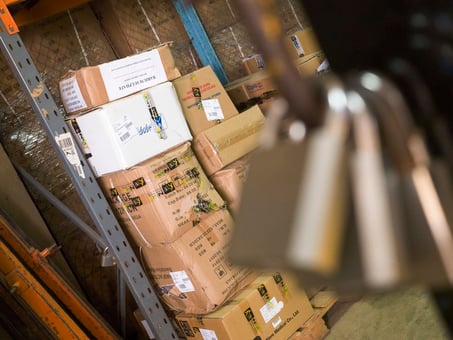4 min read
How to Handle Supply Chain Disruptions and Force Majeure - COVID-19
By: Guest Author on Apr 1, 2020 1:00:00 PM

A legal view of liability and force majeure around supply chain and production disruptions.
So far, the coronavirus outbreak has resulted in tens of thousands of deaths worldwide, with hundreds of millions of people being quarantined. Countries are closing their borders or tightening checks, across the world people are working remotely from home, factories are either shut down or running at a reduced level due to a shortage of raw materials and staff, and engineering and production resources are being tapped to tackle bottlenecks in the production of critical medical equipment.
These disruptions raise a range of complex operational, financial and legal issues, some of which require immediate attention, while others will only materialize fully later. Among the questions which will likely stay with us for quite some time after the end of the crisis are liability issues around supply chain and production disruptions.
Since the beginning of 2020, many businesses have been confronted with force majeure claims from their suppliers or have themselves felt compelled to inform customers that they will not be able to perform contracts as initially agreed. In China, a quasi-governmental organization, the China Council for the Promotion of International Trade, offered local companies “force majeure certificates” to help them escape liability for non-performance or delayed performance. While such certificates are generally not issued by authorities in Western Europe (although they are quite common in CIS states), similar claims have since been made by numerous European suppliers. In other cases, businesses have been told that goods will only be shipped if the customer accepts to pay a higher price, to cover, for example (alleged) increases in transportation costs, or delivery volumes have been unilaterally reduced to accommodate other orders. Under normal circumstances, this type of conduct will likely amount to a breach of contract and entitle the aggrieved party to damages and other remedies. In the current, extraordinary situation the question arises whether such disruptions may be excused due to the global Covid-19 pandemic.
From a legal perspective, the availability of force majeure defenses (or similar theories such as impossibility) depends on a number of factors which need to be assessed on a case by case basis. As a general rule, force majeure can only be invoked if the performance of a contract becomes impossible as a result of an unforeseeable and unavoidable external event, which cannot be overcome through reasonable measures. These conditions may well be met for some of the current disruptions, but much will depend on what the specific contract says about delivery dates, binding volume commitments, termination rights, and more generally the allocation of risks among the parties. Likewise, while increases in manufacturing or transportation costs will generally not entitle a supplier to unilateral price adjustments, there can be situations in which the change of external circumstances is so dramatic that an adjustment may be mandated as a matter of law.
It is difficult to assess the legitimacy of force majeure claims, liability for delayed deliveries or unilateral price increases while the crisis is still ongoing. Many businesses need to decide swiftly how best to communicate with customers and business partners in a climate where external parameters such as government restrictions are constantly evolving. To the extent that disagreements about liability issues arise, many of them will hopefully be resolved informally at a later stage, through negotiations. However, given the sheer magnitude of the crisis, there is no doubt that litigation or arbitration proceedings will become necessary in a number of cases to reach legally binding conclusions, particularly in situations where a lot is at stake.
Considering this risk, businesses are well-advised to promptly develop an approach for systematically documenting the specific circumstances under which claims are raised, as well as the contractual framework within which they need to be analyzed. This documentation should comprise information on the nature of the exact impediment based on which a claim or defense is raised, such as the temporary shut-down of a particular manufacturing site, but also on the specific impact of this event on the other party’s obligations. The documentation should additionally extend to formal issues, such as the applicable law and the agreed dispute resolution mechanism, compliance with notification duties, and available insurance coverage. Lastly, and importantly, internal mitigation measures need to be examined and documented, as courts or tribunals faced with potential liability claims will be interested to understand what steps were taken to minimize the impact of another’s party failure to perform, both before and after the disruption occurred.
ERP systems such as SAP have an important part to play in this, as they not only provide access to crucial business data for existing supply relationships but can additionally capture information on current disruptions in a systematic manner. Especially in sectors with many supply or sales relationships, it is helpful to pull together resources from business, finance, legal and IT to define a practical framework and processes for collecting and managing relevant information. Experience shows that it pays off to address these issues early on, both in view of negotiations with business partners and in anticipation of potential proceedings.
By Anne-Catherine Hahn
About the Author:

Anne-Catherine Hahn is a partner with IPrime Legal Ltd in Zurich, a boutique firm focusing on technology, law and compliance (https://www.iprime.law/en/). Relying on many years of practical experience gained as associate and partner with a leading global firm (Baker McKenzie), she acts as counsel, arbitrator and mediator in commercial disputes and compliance matters. She also teaches at universities and technical colleges in Switzerland, and acts as president of a conciliation commission in charge of gender equality issues within the ETH Domain, a Swiss network of high-profile technical universities and research institutions.
Photo by rhsupplies on Unsplash
Related Posts
Automating SAP operations in hybrid landscapes - CTO interview
At DSAG technology days 2020, Helge Sanden from IT-Onlinemagazin, sat to interview Bernd Engist,...
The rise of hybrid - launching Avantra editions
When we introduced Avantra Enterprise edition in 2021, we envisioned a world where we could...
How to go beyond monitoring with ML based predictive analytics
As the only AIOps platform for automating SAP operations, Avantra performs the daily tasks that...




